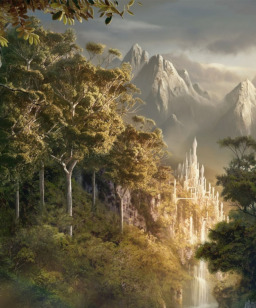Aletheia
“Memory’s images, once they are fixed in words, are erased,” Polo said. “Perhaps I am afraid of losing Venice all at once, if I speak of it. Or perhaps, speaking of other cities, I have already lost it, little by little.”
Italo Calvino, Invisible Cities
If you were to ask a pony to tell you of the centre of Equestria, its heart, they would speak to you of Canterlot, the Mountain City, and Seat of the Sun on High.
They would be wrong.
Far to the south of Canterlot, beyond the Everfree and the Badlands, in the true centre of the Equestrian continent, there lies a forest. On occasion, a passing traveler may tell tales of an ancient city deep within its depths, lost to the passage of nature and time.
In this, the forest is hardly unique; ponies speak of many such cities.
Only in the heart of winter, when the nights are long and high above in their cities of cloud the air turns breath to frost, do the pegasi speak Seren, the Midnight City.
The ponies of Seren worshipped the gods of ice, and the long dark, and the gods of the endless sky, and so in their image was the city of Seren built; above the great plains, above mountains and clouds, the ponies spun domes and towers from the very air itself. Out of wind and thought they wrought casements and archways of nothing that would look out upon the sky and claim it as their own. Under the harsh light of day, the stories say, Seren was all but invisible. But at night, bathed in the gentle glow of the moon and lit by a thousand splendid stars, Seren shone.
So too do the pegasi speak of the ponies of Seren who would shape themselves in the sky’s image; their likeness growing ever closer to that of their city of the air. And when storms passed through the distant streets of Seren, and solid walls gave way to vaulted ceilings lit by the sky in all its fury, the ponies of Seren could be seen dancing on gales and leaping from thunderbolts, air and pony all the same.
Thus was the city of Seren: a monument to the everlasting sky and its people.
Until one day, the wind changed.
Only during those twilight days between summer and fall, between beginnings and endings, do the unicorns speak of Arcadia, the City of Mirrors.
To speak of Arcadia, one must speak of the Thousand Towers that comprised the city, each and every one unique in its splendor. So flawless were their surfaces, it is said, so peerless their craftsmanship, that each towering wall and vaulted balustrade formed a mirror that reflected the true essence and beauty of all before it.
But there was another Arcadia, and it was seen in every silvered wall, every pool of still water. And where all the lines of the real Arcadia were smooth and curved, the lines of the mirror Arcadia were straight, and harsh, and cruel.
In the highest spires of Arcadia, the unicorns claim, lived gods of great beauty and power. In their name, the ponies of Arcadia bent the sky itself to cover the city, and rejoiced in the majesty of the heavens surrounding them. This, they proclaimed, was their great legacy. Fear us, it said. We can bend the heavens to our will.
But there came a day when the ponies of Arcadia could no longer distinguish their city from its reflection, and found their highest spires abandoned.
It is with the greatest solemnity that the earth ponies speak of Sophia, City of Memory.
They do not speak of a time before Sophia, for to do so would belie the truth of Sophia’s existence; the oldest of things are all of Sophia, and time before them has no meaning. Like an old tome, the legends of the city itself are worn and weathered; but among the chapters of history, some pages have yet to fade.
Murmurs of how those who dwelled in Sophia valued the subtle texture of the shadows, and how true beauty was found only in the most filtered of light.
Fragmented tales of great buildings, vast and heavy in stature, whose shadowed alcoves housed Sophia’s greatest treasures: those that had long ago lost their luster, and taken on the smokey-grey patina of age.
Whispers of how, in those hallowed halls, even the most crude and unrefined of the world's treasures shone like the crystalised air of the ages.
In Sophia, the earth ponies claim, lived not gods but the eldest and wisest of ponies, who would accept only the most ancient of things into their city. Thus Sophia came to dwarf all else in age, until it too began to fade into the recesses of memory.
In time, ponies will speak of Sophia no more, and in this final obscurity the city will be complete.
None speak of the city of Aletheia.
They do not tell tales of its magic-wrought wonders, buildings of thought and wind that could appear and vanish at one’s beck and call.
They do not speak of the majesty of its thousand splendid towers in which all things past, and all things yet to come, could be seen.
They do not mention the city’s great age, or the wisdom of its people who were looked upon by lesser beings and called gods.
Of the tragedy of its fall, or the great sorrow of its passing, there is no mention; Aletheia, the Greatest City, is forgotten.
In the heart of the Equestrian wilderness, there is a vast forest. Those few who on occasion wander past speak of great towers glimpsed within its depths.
None venture closer.
They know not of the city that waits there, in the long shadows of obscurity, until the time comes that its denizens will again walk its paths.
And how they too, in time, shall be remembered.
